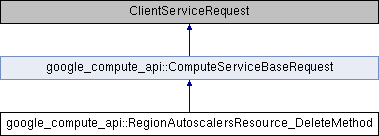#include <compute_service.h>

Public Member Functions | |
| RegionAutoscalersResource_DeleteMethod (const ComputeService *_service_, client::AuthorizationCredential *_credential_, const absl::string_view &project, const absl::string_view ®ion, const absl::string_view &autoscaler) | |
| virtual | ~RegionAutoscalersResource_DeleteMethod () |
| void | clear_request_id () |
| const string & | get_request_id () const |
| string * | mutable_requestId () |
| void | set_request_id (const string &value) |
| virtual util::Status | AppendVariable (const StringPiece &variable_name, const client::UriTemplateConfig &config, string *target) |
| virtual util::Status | AppendOptionalQueryParameters (string *target) |
| util::Status | ExecuteAndParseResponse (Operation *data) |
 Public Member Functions inherited from google_compute_api::ComputeServiceBaseRequest Public Member Functions inherited from google_compute_api::ComputeServiceBaseRequest | |
| ComputeServiceBaseRequest (const client::ClientService *service, client::AuthorizationCredential *credential, client::HttpRequest::HttpMethod method, const StringPiece &uri_template) | |
| virtual | ~ComputeServiceBaseRequest () |
| void | clear_alt () |
| const string & | get_alt () const |
| string * | mutable_alt () |
| void | set_alt (const string &value) |
| void | clear_fields () |
| const string & | get_fields () const |
| string * | mutable_fields () |
| void | set_fields (const string &value) |
| void | clear_key () |
| const string & | get_key () const |
| string * | mutable_key () |
| void | set_key (const string &value) |
| void | clear_oauth_token () |
| const string & | get_oauth_token () const |
| string * | mutable_oauthToken () |
| void | set_oauth_token (const string &value) |
| void | clear_pretty_print () |
| bool | get_pretty_print () const |
| void | set_pretty_print (bool value) |
| void | clear_quota_user () |
| const string & | get_quota_user () const |
| string * | mutable_quotaUser () |
| void | set_quota_user (const string &value) |
| void | clear_user_ip () |
| const string & | get_user_ip () const |
| string * | mutable_userIp () |
| void | set_user_ip (const string &value) |
Additional Inherited Members | |
 Protected Member Functions inherited from google_compute_api::ComputeServiceBaseRequest Protected Member Functions inherited from google_compute_api::ComputeServiceBaseRequest | |
| void | AddJsonContentToRequest (const client::JsonCppData *content) |
Detailed Description
Implements the delete method.
This class uses the Command Pattern. Construct an instance with the required parameters, then set any additional optional parameters by using the attribute setters. To invoke the method, call Execute.
One or more of these authorization scopes are required for this method: https://www.googleapis.com/auth/cloud-platform https://www.googleapis.com/auth/compute
Constructor & Destructor Documentation
◆ RegionAutoscalersResource_DeleteMethod()
| google_compute_api::RegionAutoscalersResource_DeleteMethod::RegionAutoscalersResource_DeleteMethod | ( | const ComputeService * | _service_, |
| client::AuthorizationCredential * | _credential_, | ||
| const absl::string_view & | project, | ||
| const absl::string_view & | region, | ||
| const absl::string_view & | autoscaler | ||
| ) |
The standard constructor takes all the required method parameters.
- Parameters
-
[in] <em>service</em> The service instance to send to when executed. [in] <em>credential</em> If not NULL, the credential to authorize with. In practice this is supplied by the user code that is creating the method instance. [in] project Project ID for this request. [in] region Name of the region scoping this request. [in] autoscaler Name of the autoscaler to delete.
◆ ~RegionAutoscalersResource_DeleteMethod()
|
virtual |
Standard destructor.
Member Function Documentation
◆ AppendOptionalQueryParameters()
|
virtual |
Appends the optional query parameters to the target URL.
- Parameters
-
[in,out] target The URL string to append to.
Reimplemented from google_compute_api::ComputeServiceBaseRequest.
◆ AppendVariable()
|
virtual |
Appends variable value to the target string.
This is a helper function used to resolve templated variables in the URI.
- Parameters
-
[in] variable_name The name of the templated variable. [in] config A pass-through parameter used for lists and maps. [in,out] target The string to append the value to.
Reimplemented from google_compute_api::ComputeServiceBaseRequest.
◆ clear_request_id()
|
inline |
Clears the 'requestId' attribute so it is no longer set.
◆ ExecuteAndParseResponse()
|
inline |
Executes the method and parses the response into a data object on success.
- Parameters
-
[out] data Loads from the response payload JSON data on success.
- Returns
- Success if an HTTP 2xx response was received. Otherwise the status indicates the reason for failure. Finer detail may be available from the underlying http_request to distinguish the transport_status from the overal HTTP request status.
◆ get_request_id()
|
inline |
Gets the optional 'requestId' attribute.
If the value is not set then the default value will be returned.
◆ mutable_requestId()
|
inline |
Gets a modifiable pointer to the optional requestId' attribute.
- Returns
- The value can be set by dereferencing the pointer.
◆ set_request_id()
|
inline |
Sets the 'requestId' attribute.
- Parameters
-
[in] value An optional request ID to identify requests. Specify a unique request ID so that if you must retry your request, the server will know to ignore the request if it has already been completed.
For example, consider a situation where you make an initial request and the request times out. If you make the request again with the same request ID, the server can check if original operation with the same request ID was received, and if so, will ignore the second request. This prevents clients from accidentally creating duplicate commitments.
The request ID must be a valid UUID with the exception that zero UUID is not supported (00000000-0000-0000-0000-000000000000).
The documentation for this class was generated from the following files:
- google/compute_api/compute_service.h
- google/compute_api/compute_service.cc
